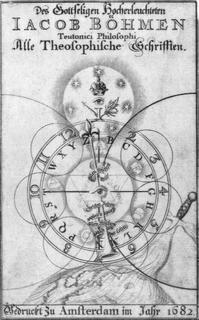
The image used on the Magnificat Website and on the season brochure is taken from the frontispiece to the collected works of Jakob Böhme, published in Amsterdam in 1682. The orginal image is reproduced above. For the website the orginal type has been photo-shopped out and for the brochure only details were used.The brochure can be downloaded by clicking this link.
 Jakob Böhme was born in 1575 in Altseidenberg, near Görlitz in eastern Germany. Following apprenticeship, he set up his own shop as a shoemaker in Görlitz, where he resided (except for a period of exile in Dresden) until his death on November 17, 1624. After a profound mystical experience at the age of twenty five (1600), while remaining active as a shoemaker and later a merchant, he embarked on a remarkable career of independent scholarship and writing. Though censured for heresy and silenced for seven years by his town council, he eventually produced some twenty nine books and tracts on philosophical theology, and gained a growing following among the nobility and professional classes of the day. (Source, where you can also find a discussion of his writings and philosophy.) A more extensive biography of Böhme can be found here. This is an excellent bibliography with lots of links, and a fabulous collection of engravings from his theosophical works can be found here.
Jakob Böhme was born in 1575 in Altseidenberg, near Görlitz in eastern Germany. Following apprenticeship, he set up his own shop as a shoemaker in Görlitz, where he resided (except for a period of exile in Dresden) until his death on November 17, 1624. After a profound mystical experience at the age of twenty five (1600), while remaining active as a shoemaker and later a merchant, he embarked on a remarkable career of independent scholarship and writing. Though censured for heresy and silenced for seven years by his town council, he eventually produced some twenty nine books and tracts on philosophical theology, and gained a growing following among the nobility and professional classes of the day. (Source, where you can also find a discussion of his writings and philosophy.) A more extensive biography of Böhme can be found here. This is an excellent bibliography with lots of links, and a fabulous collection of engravings from his theosophical works can be found here.In the publication the image is described as follows:
"Light & Darkness
At the intersection of light and the world of darkness, the human and the divine eye meet and merge in a visionary “looking-through,” which emerges “as a flash in the centre.”
The trumpet and the lily, the two ends of the pointer, herald the coming of the end of the world and the beginning of the age of the Holy Ghost. The seven circles are the qualities of nature, the days of the Creation and the spirits of God. The inner alphabet signifies “the revealed natural language,” which names all things sensually,” i.e., directly, according to their innermost quality. It was lost through Adam’s Fall from number 1, the divine unity."
J. Böhme, Theosophische Wercke, Amsterdam, 1682
2 comments:
From "Books in My Baggage" by Lawrence Clark Powell (until 1968 Librarian at UCLA):
Sooner or later everything comes in and goes out of a university library...there came one day in the spring of 1941 a small, erect man in conventional garb, carrying a checked cloth cap, who approached my desk and said, "I am Henry Miller. My publisher told me when I reached L.A. to go out to UCLA and see Larry Powell, a librarian who reads books."
"Guilty, " I said. "And sometimes on company time."
"Do you have any books by Jakob Boehme?" was Miller's first question.
"We'll go into the stacks and see," I said.
So into the great central bookstack we went in search of the German shoemaker mystic of the 1600's, whose books influenced English mystical though from William Penn to William Yeats. Our quest led us to the second underground level where, like an ore deposit, we found solid shelves of books on religion and philosophy, and one book in particular with a title Yeats thought one of the loveliest ever conceived—Boehme's "Aurora, or the Morning Redness in the Sky".
I have never seen a man change so fast as Miller did when I put that book in his hand. He settled down on his haunches on the floor and began to leaf through it, read phrases, and talk more to himself than to me. Up to then he had been rather insignificant as a person; now he began to fill out and expand, to communicate and radiate energy.
"Somewhere in the Southwest I found myself wanting to read Boehme," he said, "and of course there was no library en route that would even have heard of, much less have Boehme on its shelves. It is worse than being without water, not to have a book when you want it..."
So I left Henry Miller reading on the cold floor, and when I returned two and a half hours later, he was still there, like the Buddha, smiling and joyful...
Anthony
Thank you so much for posting that excerpt. It's lovely! There's a poignant irony about reading a tribute to the magical power of books in a post to a blog.
Warren
Post a Comment